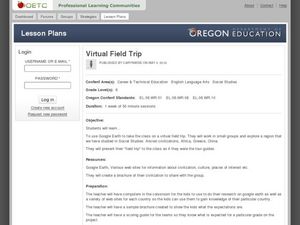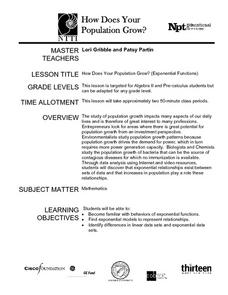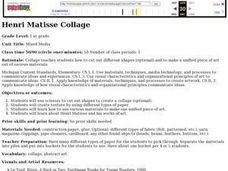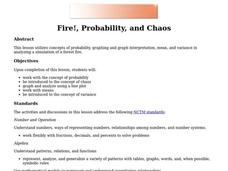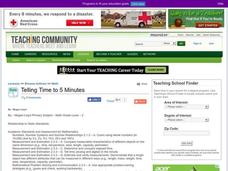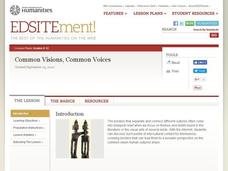Curated OER
Lesson 6: PowerPoint Presentation
Learners design a PowerPoint presentation that expresses the adverse effects of smoking. In this PowerPoint and smoking instructional activity, students examine a student PowerPoint exemplar before creating one of their own following the...
Curated OER
Can You Follow Me? Writing Instructions
Young scholars write directions for completing everyday activities. In this writing instructions lesson students exchange their set of written directions with a partner and follow their partners directions. If the directions...
Curated OER
The Job Search
Students discover information pertaining to careers they are interested in. In this career lesson, students read "From Man to Boy," by John R. Coleman and consider several career options. Students then respond to reflective questions...
Curated OER
Virtual Field Trip
This hands-on resource has future trip planners analyze graphs of mileage, gasoline costs, and travel time on different routes. While this was originally designed for a problem-solving exercise using a Michigan map, it could be used as a...
Curated OER
Student Costs Data Table
Learners compare and contrast two routes selected for a virtual field trip. They create a data table of educational activities, lodging, and meal costs using Microsoft Excel software.
Albert Shanker Institute
Economic Causes of the March on Washington
Money can't buy happiness, but it can put food on the table and pay the bills. The first of a five-lesson unit teaches pupils about the unemployment rate in 1963 and its relationship with the March on Washington. They learn how to create...
Curated OER
Shapes from Shapes
Geometric shapes are really cool. Examine triangles, quadrilaterals, trapezoids, rhombuses, parallelograms, pentagons, and hexagons with your class. They draw large shapes and small shapes then compare them to understand their shapely...
Florida Center for Instructional Technology
Integrating Mathematics into Literature
You class will read Cucumber Soup by Vickie Leigh Krudwig as an anticipatory set for this lesson on ratios. They make models of the insects in the story and then use them as a source of data for this ratio and proportion lesson. This...
Curated OER
Class of Gold
How can you see a number in nature? Here, learners discover both Fibonacci numbers and the golden ratio by exploring a number of different resources. Note: Some of the resources are older and may be missing some of the links, but...
Curated OER
How Does Your Population Grown?
Do you know how the population has grown of your community? Can you predict the population over the next half century? Can we find an algebraic model that matches our data? These along with many more questions can be researched by...
Curated OER
Theobroma - Food of the Gods
Students discuss the history of cacao and its use in the production of chocolate. They analyze actual cacao pods and record their observations. Finally they create a five minute contour drawing of the cacao pod and seeds.
Curated OER
Maps and Modes, Finding a Mean Home on the Range
Fifth graders investigate data from maps to solve problems. In this data lesson, 5th graders study maps and collect data from each map. Students present their data in a variety of ways and calculate the mode, mean, median, and range.
Curated OER
Cardboard Radial Weaving
Students explore cultural history by participating in an arts and crafts activity. In this weaving lesson, students identify the many cultures that used weaving methods and local plant life to create baskets and other useful tools....
Curated OER
Understanding 10: Backwards and Forwards
Help your young mathematicians completely master 10 by practicing one-to-one correspondence, number recognition, and recording numbers displayed. They make 10 with groups of two-different colored cubes and color in 10-frames to show how...
Curated OER
Henri Matisse Collage
First graders explore the work of Henri Matisse. They use shapes to create a collage. Students create texture in their collage by using various types of papers and they study how to use various materials to make one unified piece of art.
Curated OER
It's Time for Testing Skills Rock!
Fourth graders take an inventory to assess their ability to utilize study and test taking skills. They receive the "Testing Skills Rock" song and start singing it. Students identify and underline the test taking skills mentioned in the...
Curated OER
Cultural Awareness/Sharing Traditions
Learners examine and explore cultural traditions that make their own families unique. In groups, they discuss traditions, write about the similarities and differences in the group, and interview other students.
Curated OER
Value Study Marker -- Using Chuck Close as a Catalyst
Sixth graders examine the work of artist Chuck Close. They create their own image using markers that show a range of values. They develop a grid to replicate those values.
Curated OER
Value Study Pencil -- Using Chuck Close as a Catalyst
Seventh graders examine the life of artist Chuck Close. They use markers to create an image to show a range of values. They develop a grid to represent these values.
Curated OER
Scarcity of Land Throughout the World and in Hawaii
Students discuss the importance of "land." They review the four types of land classification--urban, rural, agricultural and conservation--and participate in an activity involving an apple that demonstrates the use of land in Hawaii....
Curated OER
Fire!, Probability, and Chaos
Upper elementary and middle schoolers work with the concept of probability. They are introduced to the concept of chaos. Learners graph and analyze using a line plot, work with mean, and are introduced to the concept of variance.
Curated OER
Box Plots
Young statisticians are introduced to box plots and quartiles. They use an activity and discussion with supplemental exercises to help them explore how data can be graphically represented.
Curated OER
Telling Time to 5 Minutes
In this second grade lesson your class will practice telling time. The goal is to tell time to five minutes using an analog clock. Your young students count by 5 minute intervals and discuss elapsed time.
Curated OER
Common Visions, Common Voices
Students analyze common recurring motifs and themes found in literature and artwork from various cultures. They research and report of the "trickster" motif found in Native american, Mayan, and Ethiopian cultures.



